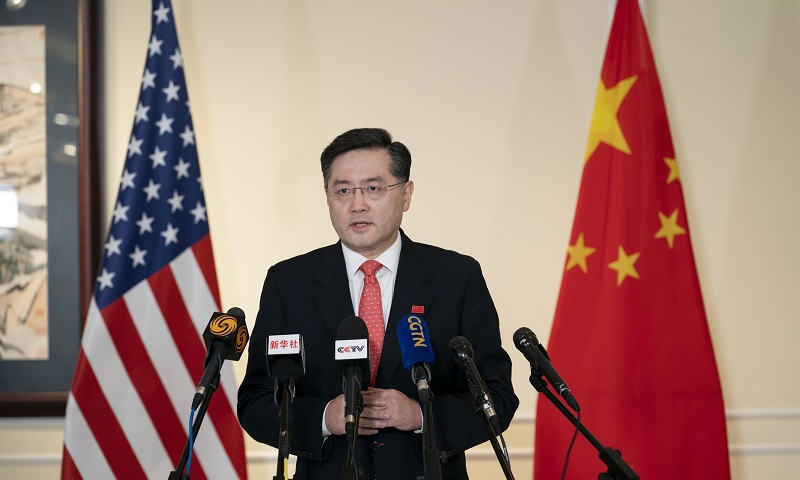
Qin Gang Photo: website of China's embassy in the US
As the position of US ambassador to China remains vacant after over 10 months, a rare occurrence since the two countries established diplomatic ties, Chinese experts on US affairs believe that the Biden administration wants to prioritize direct talks with China through higher-level officials because the role of an ambassador, as a policy executive, is quite limited who needs a higher official to "set the tone" on big issues.
Qin Gang, China's new ambassador to the US, arrived in Washington on July 29, ending a month-long gap between the two countries. However, the post of US ambassador to China has been vacant since former ambassador Terry Branstad left Beijing in October 2020.
The absence of an ambassador, a key diplomatic channel, has raised more speculations at a time when US-China relations are at a historic low. It has been reported that the Biden administration plans to appoint Nicholas Burns, a former US Permanent Representative to NATO, as the new ambassador. However, the nomination has yet to be announced, and it is not known when the US Senate will confirm it.
Lü Xiang, a research fellow on US studies at the Chinese Academy of Social Sciences in Beijing, told the Global Times on Monday that the Biden administration wants to prioritize direct talks with China through higher-level officials, such as the deputy secretary of state, rather than through an ambassador.
"Currently the China-US relations are sensitive, complex and thorny. As an implementer of the country's policy rather than a decision-maker, the US ambassador's role in China is quite limited. It is better for the ambassador to wait for a higher level to 'set the tone' on more big issues before taking office," Lü said.
Some experts believe the difficulty to appoint a new ambassador also reflects the Biden administration's China's policy: To deal with China "outside China."
Li Haidong, a professor at the Institute of International Relations of China Foreign Affairs University, explained that the key for Biden is not to seek China's compromise and concessions on key issues, because it is difficult to achieve that goal, but to push more countries into the track of following the US in its comprehensive strategic competition with China by intensifying disputes these countries have with China.
Against this backdrop, the Biden administration is anticipated to consider naming an ambassador to China only after it has sorted out its alliances and partnerships and appointed ambassadors to those countries, Li told the Global Times on Monday.
Some analysts believe that part of the reason for the delay in the appointments of key positions is that the Biden administration does not want its choices to be forced to face challenges and harsh voices in congressional hearings, which will reduce the space for the administration to deal with difficult issues.
In addition, some people familiar with the nominations said that the State Department's understaffed security services and the longer background checks and ethics vetting process required for potential candidates also slowed the nomination process. Therefore, as the US Congress heads into its summer recess until the end of August, it is even more likely that some candidates won't be confirmed until 2022.
Lü said senior officials who were appointed by Biden would have almost been challenged at the hearings, and the situation shall be the same for the US ambassador to China.
In the US political tradition, administration officials are usually expected to show respect to lawmakers, and are bound to say something in response to questioning, thus reducing the room for action. As a result, the Biden administration has shown a slow pace in selecting and nominating many officials, including ambassadors, Lü said.
The US has yet to appoint ambassadors to a number of its allies, including Japan. The post to Japan remains vacant for the longest time since the World War II after former US ambassador William Hagerty stepped down in July 2019 to run for the US Senate.
However, it is worth mentioning that the American Institute in Taiwan (AIT) announced in early July Sandra Oudkirk as the director of the Taipei office and the appointment was very fast.
On one hand, this is due to the fact that the director of the Taipei office can be appointed by an executive order without a congressional hearing, which speeds up the process, Li said.
On the other hand, it also reflects once again the extreme pathologies of the domestic political atmosphere in the US - that any issue of confrontation with China can be quickly promoted while any issue that involves exchange or cooperation with China is fraught with difficulties, he noted.




